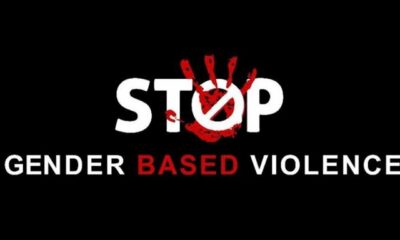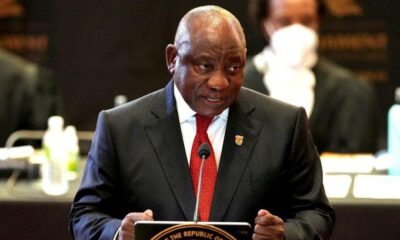News
“These Claims Are False”: Women For Change Founder Hits Back as Old Allegations Resurface After National Shutdown

Women For Change Leader Rejects Claims of Fraud as Movement Gains Momentum
Just days after Women For Change (WFC) pulled off a nationwide women’s shutdown that dominated headlines and social media timelines, the organisation’s founder, Sabrina Walter, finds herself fighting a very different battle accusations that she and her organisation are nothing more than scammers.
It’s not the first time these claims have surfaced, but the timing has struck many as suspicious. With GBVF cases rising and South Africans increasingly vocal about the state’s response to violence against women, WFC’s mobilisations have become high-profile moments in the activism space. And with visibility often comes scrutiny and online backlash.
View this post on Instagram
“We Don’t Profit From This Work” – Walter Responds
In a strongly worded statement released on Wednesday, Walter dismissed the allegations that she and WFC misused funds or operated without proper registration.
“Claims that WFC is ‘not registered,’ that we ‘profit financially,’ or that we ‘use millions for personal gain’ are completely false,” she said.
She added that the insinuations undermine real work being done for survivors of gender-based violence and femicide (GBVF), especially following the success of the recent G20 women’s shutdown.
“It is deeply disappointing to see false and defamatory allegations being spread about Women For Change and me as the founder.”
@tattooedpa
♬ original sound – Tattooed Papi
Where the Criticism Is Coming From
At the centre of the renewed accusations is a TikTok user known as Tattooed Papi, who has previously clashed with WFC. His recent videos question the organisation’s real-world impact:
“What core work do you do for survivors? Where are these survivors?” he asked, claiming that no one has publicly come forward to say WFC supported them.
His comments have reignited conversations around transparency and accountability in activist spaces, a topic South Africans are increasingly vocal about, especially on platforms like TikTok, X, and Facebook.
Two German feminist women scammed the purple profile gang of idiots 🟣 😅@womenforchange5 you need to be investigated.@chrisbrown you need to sue this organisation to oblivion for using your image negatively without your permission pic.twitter.com/MZ6x4o1eH5
Norma Kay (@realnorma_kay) November 25, 2025
Old Wounds: The Chris Brown Petition Saga
Much of this tension traces back to late 2023 and 2024, when WFC spearheaded a petition calling on government departments to bar US singer Chris Brown from performing in South Africa. The group cited Brown’s history of violence against women, arguing that allowing him to headline shows in Johannesburg sent the wrong message in a country grappling with GBVF.
Despite their campaign, the concerts went ahead and were met with huge fan turnout and strong defence from Brown’s supporters online. Since then, Walter says she’s experienced sustained harassment.
“I have been targeted with hate speech, xenophobia, harassment and coordinated attempts to destroy my credibility,” she said.
She confirmed she has opened a criminal case, secured a protection order, and filed a civil High Court matter.
WFC Shows Its Receipts
To counter the claims, WFC has made its documentation publicly available. According to the NPO’s registration certificate, the organisation was originally registered on 12 December 2018 under the name Catch Me If You Can Athletic Club (CMIYC). It officially transitioned to Women For Change in 2023 a change some critics misinterpreted as a lack of registration.
The website also hosts financial statements for the past three years, detailing income, expenditure, and operations.
The organisation says the documents confirm:
-
Legal NPO registration
-
Tax compliance
-
Verified financial management
-
Full operational accountability
In Walter’s words:
“Spreading misinformation against an organisation fighting for women’s lives is not activism it harms survivors.”
A Bigger Conversation About Activism in SA
There’s no denying that South Africa’s activist landscape is complicated. Organisations working on GBVF issues often navigate an emotional, politically charged space where trust, visibility, and responsibility constantly collide.
Some activists argue that the criticism reflects a growing demand for transparency from NPOs. Others believe certain online voices weaponise internet platforms to discredit women-led advocacy groups, especially when those groups take on powerful public issues.
What is clear is that Women For Change has become a lightning rod, both for survivors seeking justice and for critics who question its methods.
With legal proceedings underway, Walter says she remains focused on the work:
-
Supporting survivors
-
Continuing national advocacy
-
Driving campaigns such as the call for GBVF to be declared a national disaster
Whether the controversy fades or escalates will likely depend on the outcomes of the legal cases and how the public continues responding online.
But for now, Women For Change is standing firm, insisting it has nothing to hide and everything still to fight for.
{Source: The Citizen}
Follow Joburg ETC on Facebook, Twitter , TikTok and Instagram
For more News in Johannesburg, visit joburgetc.com


























